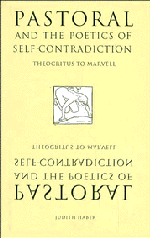Book contents
- Frontmatter
- Contents
- Acknowledgments
- Texts and abbreviations
- Introduction: “Remedies themselves complain”: pastoral poetry, pastoral criticism
- 1 Bringing it all back home: bucolic and heroic in Theocritus' Idylls
- 2 Si numquam fallit imago: Virgil's revision of Theocritus
- 3 Pastime and passion: the impasse in the Old Arcadia
- 4 Complaints themselves remedy: Marvell's lyrics as problem and solution
- Epilogue Farewell to pastoral: The Shepherd's Week
- Notes
- Works cited
- Index
Epilogue Farewell to pastoral: The Shepherd's Week
Published online by Cambridge University Press: 17 August 2009
- Frontmatter
- Contents
- Acknowledgments
- Texts and abbreviations
- Introduction: “Remedies themselves complain”: pastoral poetry, pastoral criticism
- 1 Bringing it all back home: bucolic and heroic in Theocritus' Idylls
- 2 Si numquam fallit imago: Virgil's revision of Theocritus
- 3 Pastime and passion: the impasse in the Old Arcadia
- 4 Complaints themselves remedy: Marvell's lyrics as problem and solution
- Epilogue Farewell to pastoral: The Shepherd's Week
- Notes
- Works cited
- Index
Summary
Break off, I pray, ye Muses, break off the pastoral song.
… O Muses, fare you well,
And again farewell. Another day a sweeter song I'll sing you.
Theocritus, IdylliSurgamus: solet esse gravis cantantibus umbra,
iuniperi gravis umbra; nocent et frugibus umbrae,
ite domum saturae, venit Hesperus, ite capellae.
Arise: the shade weighs heavily on singers,
The shade of junipers, and shade harms crops.
Go home well fed, my goats: go: Vesper comes.
Virgil, Eclogue 10Tomorrow to fresh woods, and pastures new.
Milton, “Lycidas”Let's in.
Marvell, Upon Appleton HouseMarvell's self-conscious exploration of pastoral paradoxes makes his poetry a convenient stopping place for this study: it provides us both with a sense that pastoral has, in effect, ended where it began, and with a very clear consciousness of the arbitrariness of such “beginnings” and “endings.” If much of his poetry seems to be a farewell to pastoral, it is well to remember that this is a space that has always been occupied by pastoral poetry – and it is a space that pastoral will continue to inhabit. The self-contradictory constructions that Marvell appears to push to their limits reappear, in different forms, not only in contemporary works like Paradise Lost – in which prelapsarian nature is created by an art supremely self-conscious of its own limitations – but also in modern poems such as (to cite only one of the more obvious examples) Robert Frost's exercise in pastoral praeteritio, “The Need of Being Versed in Country Things.”
- Type
- Chapter
- Information
- Pastoral and the Poetics of Self-ContradictionTheocritus to Marvell, pp. 153 - 160Publisher: Cambridge University PressPrint publication year: 1995

